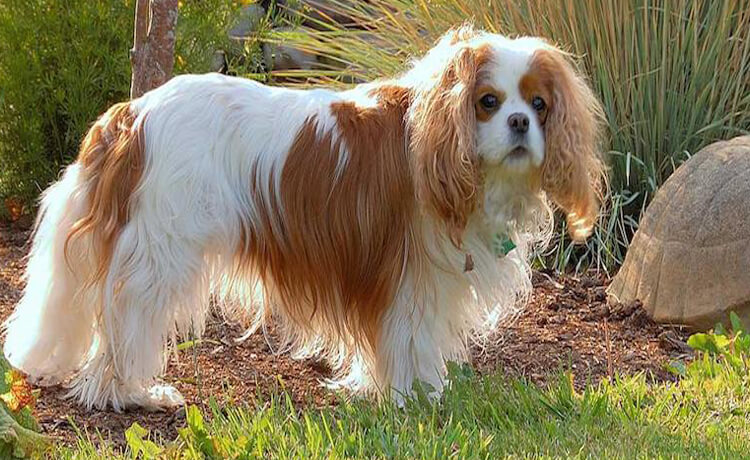
English Toy Spaniel
The English Toy Spaniel, also known as the King Charles Spaniel in some regions, is a charming, small dog breed with a noble appearance and a gentle, affectionate personality. Known for its beautiful silky coat and expressive face, this breed makes an excellent companion for families, individuals, and seniors alike.
1. Appearance
- Size: The English Toy Spaniel is a small breed, typically weighing between 8 to 14 pounds and standing about 10 to 11 inches tall at the shoulder.
-
Coat: The breed has a long, flowing, silky coat that requires regular grooming to prevent tangles and mats. The coat can come in a variety of color combinations, including:
- Blenheim(chestnut and white)
- Tricolor(black, white, and tan)
- Black and Tan
- Ruby(solid chestnut)
- Face and Expression: The English Toy Spaniel is often described as having a “push-faced” look with large, dark eyes that give them an appealing, almost regal expression. Their head is round with a well-defined stop (the area where the muzzle meets the forehead), and their ears are long and covered with thick, feathered hair.
2. Temperament
- Affectionate and Loving: This breed is known for its loving nature and strong bond with its family. English Toy Spaniels are incredibly affectionate and enjoy being close to their owners, often seeking out lap time and cuddles.
- Gentle and Calm: These dogs have a calm and gentle demeanor, making them great companions for those looking for a laid-back pet. They are typically not overly energetic, but they enjoy playtime and walks.
- Sociable: English Toy Spaniels are friendly and tend to get along well with other pets, including dogs and cats. They are also good with children, making them ideal family pets.
- Intelligent and Trainable: While they are intelligent and relatively easy to train, they do have an independent streak, which means training should be done with patience and consistency. They respond well to positive reinforcement, such as treats and praise.
3. Health
- Life Expectancy: The English Toy Spaniel has an average lifespan of around 10 to 12 years.
-
Common Health Issues: Like many small breeds, the English Toy Spaniel can be prone to certain health problems, such as:
- Heart Issues: They are prone to mitral valve disease, a heart condition that affects many small dog breeds.
- Eye Problems: Due to their prominent eyes and short snout, they may be prone to certain eye conditions, including cataracts and dry eye.
- Brachycephalic Syndrome: As a breed with a pushed-in face, they may be susceptible to breathing problems, especially in hot or humid weather.
- Joint Problems: English Toy Spaniels may experience issues like patellar luxation (dislocated kneecap) and hip dysplasia, common in many toy breeds.
4. Care and Grooming
Essentials for Your Newly Adopted Pet
Welcoming a shelter pet into your life is a beautiful journey. Here are some handpicked items to help your new friend feel safe, loved, and right at home:
- Grooming Needs: The long, silky coat of the English Toy Spaniel requires regular grooming to keep it clean and free from mats. Brushing several times a week, along with occasional baths, is necessary to maintain the coat's health and appearance.
- Teeth and Ear Care: Their long ears should be checked regularly for signs of infection or wax buildup, and their teeth should be brushed to prevent dental issues, which are common in small dogs.
- Exercise Needs: English Toy Spaniels are not very high-energy and don’t require intense exercise. A few short walks a day and interactive playtime will keep them happy and healthy. However, they enjoy being active and alert during their walks or play sessions.
5. Training
- The English Toy Spaniel is generally intelligent and eager to please, making them relatively easy to train. However, they can be a bit stubborn at times, so patience and positive reinforcement methods work best.
- Early socialization is essential, as it helps them become comfortable around other pets, people, and new environments. Since they are a bit reserved around strangers, gentle introductions to new experiences will ensure they grow into confident dogs.
6. Best Environment
- English Toy Spaniels are adaptable and do well in various living environments, whether it’s an apartment or a house. Due to their calm and affectionate nature, they do best in homes where they receive plenty of attention and interaction from their owners.
- They are ideal for owners who want a companion dog that enjoys relaxing at home but also appreciates daily walks and some playtime.
Conclusion
The English Toy Spaniel is a delightful companion known for its sweet, affectionate nature and beautiful appearance. While their long coat requires regular grooming, their calm demeanor and love for companionship make them a joy to have in the home. Whether you're seeking a family pet or a devoted lap dog, the English Toy Spaniel is sure to make a loving addition to any household.
Affiliate Products
Up to 75% Discount

Dog Collar with Health Monitoring
BUY NOW »
Up to 55% Discount

Luxury Faux Furhuge Napping Bed
BUY NOW »

